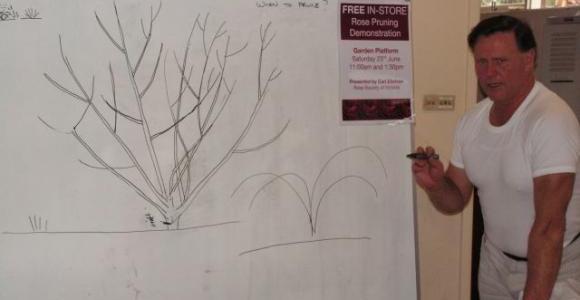
Roses
You are here

Joan introduced Glen Aitken from Frankston. Glen is a previous Mayor and current Councillor in Frankston and great friend to the owners of the Garden Platform nursery in Ashburton.
Glen mentioned that clubs and societies bring people together and provide fellowship and support for members. Glen loves gardening and finds it a rewarding escape from his other responsibilities. Glen has a large block of land in Seaford, which has been in his family for over one hundred years and is admired by passers-by.
Old-fashioned roses, David Austin and hybrid tea are some of the varieties currently available. New plants are better purchased in pots rather than bare-rooted as plants can fail if their roots have been allowed to dry out. When planting, it is very important to feed, care for and nurture it to establish its structure and root systems. They need water and food to prevent stunted growth. The drought was a proving ground for roses and they came up trumps under difficult conditions. The lack of humidity suited them.
Soil quality is very important – Glen deals with porous, sandy soil, but soil in Camberwell is generally heavier which retains moisture and nutrients better.
Better colours and slower blooming result from heavier soils.
Do not dig deeply around the rose and damage its root system. Feeder roots are easily cut with a spade. Avoid root competition – don’t plant close to other plants with invasive roots. Interference can impact on their performance and shade should also be avoided.
Roses can be planted in pots when you run out of room in the garden. Smaller varieties are best for pots. Weakened roses are more susceptible to ill health and disease.
Modern bush roses need to have their graft above the level of the soil.
When watering, the golden rule is do not water at night, particularly do not wet the foliage. First thing in the morning is best to restrict black spot and mildew.
Possums – are a problem! These can decimate the bushes at night. Spraying with Poss-Off every night does work and throw blood and bone into the air to settle on the plants. This needs to be done consistently to achieve results – repeat applications break their travel path. Do it every night for a week and then every second night for around two weeks. Vaporub along the fence line is another deterrent to try.
Wind and hail damages the flowers but humidity is the worst condition for roses. Provide some space around each bush to allow air to circulate and prevent diseases spreading from one plant to another. Be watchful and spray at the first signs of disease. White scale can be nasty; it spreads and can ultimately kill the plant – remove this with a toothbrush. To remove die back, cut every bit off with disinfected secateurs and dispose of the cuttings in the rubbish, not the compost.
New roses are being bred and released all the time – one new release is Black Caviar, named for the famous racehorse. Glen favours roses with perfume and showed us some of his favourites – Pat Austin, Cymbeline, Mary Rose and Golden Celebration from David Austin, Black Boy, an old rose with a lovely perfume, a recent white rose Pope John Paul, Mr Lincoln a modern hybrid tea, the famous Blue Moon and an Alistair Clarke rose, Lady Hillingdon.
When pruning roses note that some of the old fashioned and David Austin varieties tend to get long arching canes- if that’s its habit, allow it to retain this shape.
Suckers from below the graft can be deceptive and look like part of the plant – these need to be deleted completely either cut as close as you can to the stalk or wrench out cleanly and paint with sealer. Second week of July is Glen’s recommended time to prune – don’t leave until the plants have used energy to produce new growth, which you will then remove. Prune to increase airflow through the plant and remove branches that cross over each other. Twiggy growth needs to be removed but there is no need to cut almost to the ground, as is done in Europe due to the snow.
Cut to an outward facing bud.
Glen starts feeding his roses in August and continues throughout the season, using a rotation of different fertilisers such as Sudden Impact, Dynamic Lifter, Blood and Bone and liquid fertilisers on a monthly basis.
Mulching helps to retain moisture and keep the soil at a suitable temperature as well as deterring weeds.








